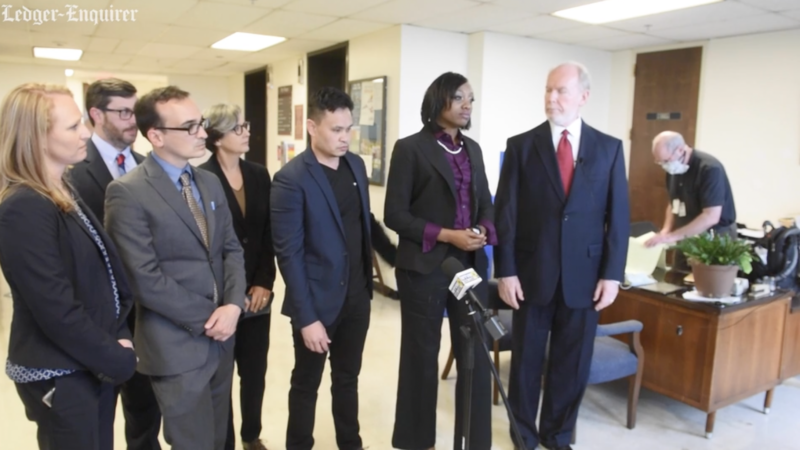Arizona Gov. Doug Ducey yesterday signed a package of civil forfeiture reforms that will make it substantially harder for law enforcement agencies to take people’s stuff by alleging that it is connected to criminal activity. H.B. 2810—which was approved by the state House in February and by the state Senate last week, in both cases by overwhelming margins—shows once again that legislators can defy the money-grubbing objections of police and prosecutors who worry that due process for property owners will derail the civil forfeiture money train.
Civil forfeiture, which is based on the legal fiction that property can be guilty even when its owner is innocent, allows the government to confiscate people’s assets without ever accusing them of a crime, let alone convicting them. H.B. 2810 addresses that problem by requiring a criminal conviction prior to forfeiture in most cases.
Under the law, property can still be seized based on probable cause to believe it was used to commit a crime or represents the proceeds of illegal activity. But now the government can complete the forfeiture only after convicting the owner. That new rule applies to all forfeitures except when the owner has died or fled, no longer lives in the United States, has abandoned the property, has agreed to surrender it as part of a plea deal, or has received immunity from prosecution in exchange for his testimony.
Most jurisdictions theoretically allow innocent owners to recover their property, but that typically requires them to prove their innocence, a reversal of the presumption that applies in criminal cases. H.B. 2810 instead puts the burden on the government to prove by “clear and convincing evidence” that the owner “had actual knowledge of the underlying crime that gave rise to the forfeiture.”
According to a tally by the Institute for Justice, Arizona is the 16th state to require a criminal conviction for some or all forfeitures. It is the 14th state to require that the government prove an owner is not innocent rather than making the owner prove that he is.
Even though it is perfectly legal to carry large amounts of cash, police tend to view it as inherently suspicious; they often seize money even when there is no evidence that it was derived from criminal activity. H.B. 2810 takes aim at that practice by declaring that “the presence or possession of U.S. currency, debit cards or credit cards, without other indicia of a crime that subjects property to forfeiture, is insufficient probable cause for seizure.”
Police have been known to cite the odor of marijuana or the discovery of drugs, even in tiny quantities, as an excuse to seize cash. H.B. 2810 eliminates “the inference that money or any other negotiable instrument found in proximity to contraband or to instrumentalities of an offense are proceeds of the contraband or intended to be used to facilitate the offense.”
Even when an owner can afford to challenge a forfeiture, and assuming that the property is worth enough to justify the legal expense (which it often isn’t), he cannot do anything until he is officially notified that the government is seeking to keep the property. Delays can drag on for months or even years. But not under H.B. 2810. Within 60 days of a seizure, it says, the government must return the property or notify the owner of a pending forfeiture proceeding, and the notice must include “the specific statutory and factual grounds for the seizure.”
After an owner receives a forfeiture notice, the law gives him 60 days to respond—twice as long as previously allowed. It requires a hearing within 30 days after the owner files a claim seeking the return of his property. The court is required to grant the claim if it finds that “the final judgment will likely require the state to return the property,” “the property is not reasonably required to be held for evidentiary reasons,” or “the property is the only reasonable means for a defendant to pay for legal representation.”
To complete a forfeiture, the government must show by clear and convincing evidence that “the property is subject to forfeiture,” that “the criminal prosecution related to the seized property resulted in a conviction,” and that “there is no innocent owner or third-party interest holder to whom the property should be delivered.” The government also has to prove that the value of the property “does not unreasonably exceed” the “pecuniary gain” from the underlying crime or the “pecuniary loss” caused by the crime.
That last requirement is aimed at preventing forfeitures that are clearly disproportionate to the offenses cited to justify them. Under Arizona’s new standard, for example, it would be hard to defend confiscating someone’s car because it was used for a $25 drug sale. While the Supreme Court has held that “grossly disproportionate” civil forfeitures can violate the Eighth Amendment’s prohibition of “excessive fines,” Arizona’s requirement seems more demanding.
Police previously could avoid the nuisance of actually pursuing a forfeiture by pressuring the owner to “voluntarily” surrender it. H.B. 2810 bans that practice. It says “a peace officer may not request, require, or in any manner induce a person to execute a document that attempts to disclaim an interest in or right to property or that relinquishes interests in or rights to property.”
Another shortcut previously allowed in Arizona authorized prosecutors to declare forfeitures “uncontested,” in which case judges were required to approve confiscation of the property. “Amazingly,” the Institute for Justice noted before H.B. 2810 was passed, “Arizona law says that courts have to take prosecutors at their word when they demand ‘uncontested forfeiture,’ an administrative proceeding where there is no judge, but rather a prosecutor who reviews petitions and decides whether to keep the property or return it.” H.B. 2810 abolishes that practice as well.
These changes go much further than the forfeiture reforms that the Arizona legislature approved in 2017, when it increased oversight and transparency, prohibited federal adoption of forfeitures worth less than $75,000, and raised the standard of proof from a preponderance of the evidence to clear and convincing evidence. The overwhelming support for H.B. 2810, which was opposed by only two members of the state House and just one member of the state Senate, is especially striking in light of what happened last year, when a bill requiring conviction prior to forfeiture was unanimously approved by the Senate but foundered in the House, where Democrats unanimously opposed it.
Among other things, opponents of that bill worried that it would deprive law enforcement agencies of money they need to supplement their budgets. Maricopa County Attorney Allister Adel did not mention that financial motive when she urged Ducey to veto H.B. 2810. Instead she argued that “civil asset forfeiture is an important and powerful tool, used by law enforcement to efficiently interrupt the money supply of criminal enterprises.” She warned that the reforms would make Arizona “an attractive home for money laundering and other criminal financial transactions.”
There is little evidence to support Adel’s fear that forfeiture reforms will cripple law enforcement. “This does not prevent law enforcement from doing their jobs,” Lauren Krisai, a senior policy analyst at the Justice Action Network, told The Arizona Republic. “They can still seize property that they are suspecting is connected to a crime. They just have to achieve a criminal conviction before they can permanently keep it.” Adel thinks that is too much to expect, because “in many situations” it is “obvious that funds are the product of criminal activity”—too obvious to bother proving it.
“Civil forfeiture threatens everyone’s property and due process rights,” says Paul Avelar, managing attorney at the Institute for Justice’s Arizona office. “The government can take your car, your home, and your life savings without ever charging you with a crime, much less convicting you. HB 2810 makes important reforms to Arizona’s forfeiture laws to protect innocent property owners from government abuse.”

from Latest – Reason.com https://ift.tt/33jiJxC
via IFTTT



